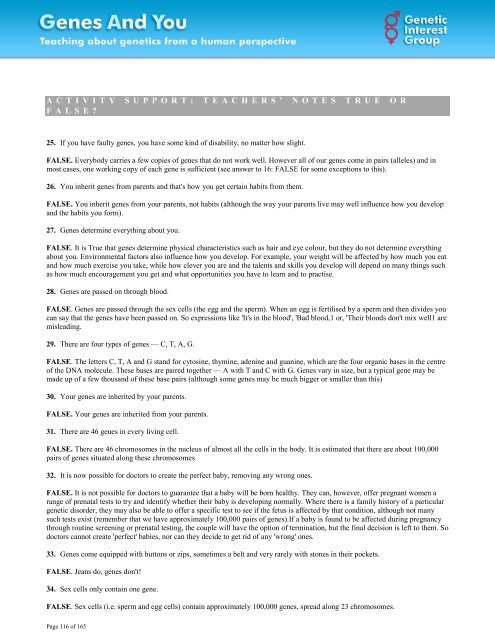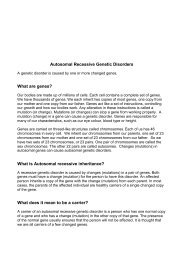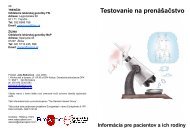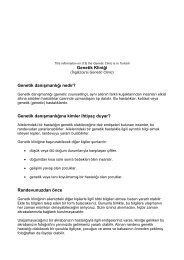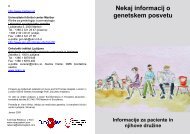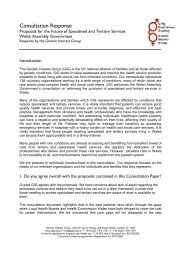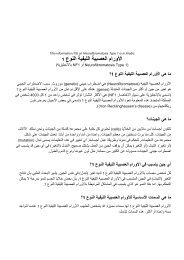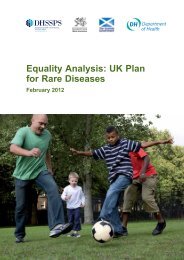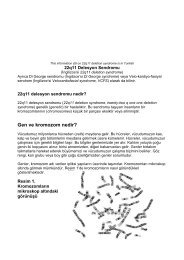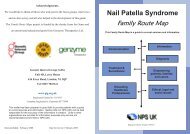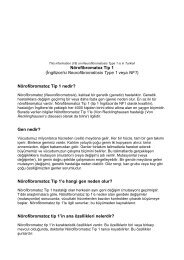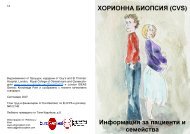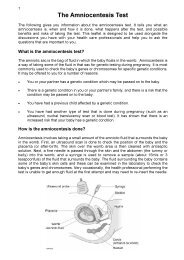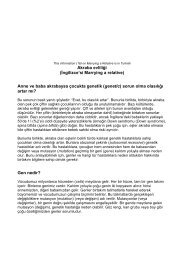TRUE OR FALSE? - Genetic Alliance UK
TRUE OR FALSE? - Genetic Alliance UK
TRUE OR FALSE? - Genetic Alliance UK
Create successful ePaper yourself
Turn your PDF publications into a flip-book with our unique Google optimized e-Paper software.
A C T I V I T Y S U P P O R T : T E A C H E R S ’ N O T E S T R U E O R<br />
F A L S E ?<br />
25. If you have faulty genes, you have some kind of disability, no matter how slight.<br />
<strong>FALSE</strong>. Everybody carries a few copies of genes that do not work well. However all of our genes come in pairs (alleles) and in<br />
most cases, one working copy of each gene is sufficient (see answer to 16: <strong>FALSE</strong> for some exceptions to this).<br />
26. You inherit genes from parents and that's how you get certain habits from them.<br />
<strong>FALSE</strong>. You inherit genes from your parents, not habits (although the way your parents live may well influence how you develop<br />
and the habits you form).<br />
27. Genes determine everything about you.<br />
<strong>FALSE</strong>. It is True that genes determine physical characteristics such as hair and eye colour, but they do not determine everything<br />
about you. Environmental factors also influence how you develop. For example, your weight will be affected by how much you eat<br />
and how much exercise you take, while how clever you are and the talents and skills you develop will depend on many things such<br />
as how much encouragement you get and what opportunities you have to learn and to practise.<br />
28. Genes are passed on through blood.<br />
<strong>FALSE</strong>. Genes are passed through the sex cells (the egg and the sperm). When an egg is fertilised by a sperm and then divides you<br />
can say that the genes have been passed on. So expressions like 'It's in the blood', 'Bad blood,1 or, 'Their bloods don't mix well1 are<br />
misleading.<br />
29. There are four types of genes — C, T, A, G.<br />
<strong>FALSE</strong>. The letters C, T, A and G stand for cytosine, thymine, adenine and guanine, which are the four organic bases in the centre<br />
of the DNA molecule. These bases are paired together — A with T and C with G. Genes vary in size, but a typical gene may be<br />
made up of a few thousand of these base pairs (although some genes may be much bigger or smaller than this)<br />
30. Your genes are inherited by your parents.<br />
<strong>FALSE</strong>. Your genes are inherited from your parents.<br />
31. There are 46 genes in every living cell.<br />
<strong>FALSE</strong>. There are 46 chromosomes in the nucleus of almost all the cells in the body. It is estimated that there are about 100,000<br />
pairs of genes situated along these chromosomes<br />
32. It is now possible for doctors to create the perfect baby, removing any wrong ones.<br />
<strong>FALSE</strong>. It is not possible for doctors to guarantee that a baby will be born healthy. They can, however, offer pregnant women a<br />
range of prenatal tests to try and identify whether their baby is developing normally. Where there is a family history of a particular<br />
genetic disorder, they may also be able to offer a specific test to see if the fetus is affected by that condition, although not many<br />
such tests exist (remember that we have approximately 100,000 pairs of genes).If a baby is found to be affected during pregnancy<br />
through routine screening or prenatal testing, the couple will have the option of termination, but the final decision is left to them. So<br />
doctors cannot create 'perfect' babies, nor can they decide to get rid of any 'wrong' ones.<br />
33. Genes come equipped with buttons or zips, sometimes a belt and very rarely with stones in their pockets.<br />
<strong>FALSE</strong>. Jeans do, genes don't!<br />
34. Sex cells only contain one gene.<br />
<strong>FALSE</strong>. Sex cells (i.e. sperm and egg cells) contain approximately 100,000 genes, spread along 23 chromosomes.<br />
Page 116 of 165


